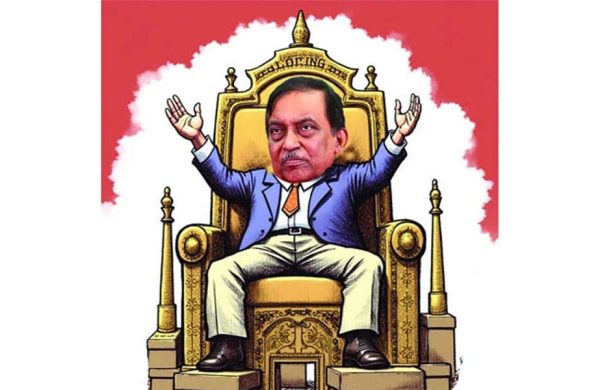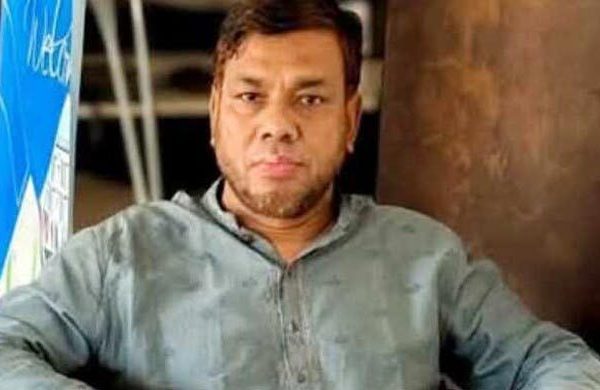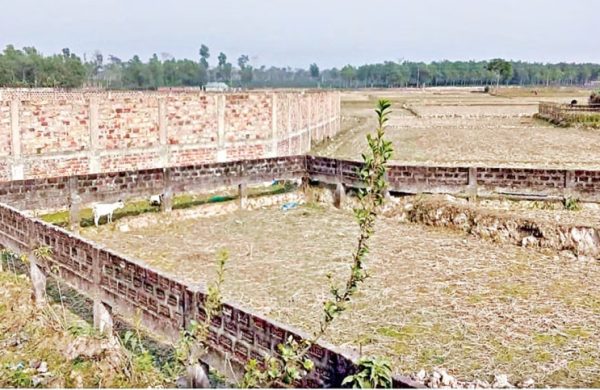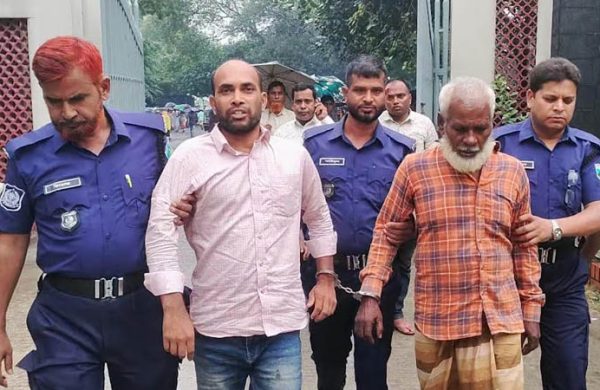Criminals are Khan’s Gold mines
- Update Time : Saturday, July 12, 2025

TDS Desk:
In Hindi films, ‘Khan’ is a symbol of popularity. For over three decades, Bollywood has been mesmerized by the dominance of the three Khans. It is said that Bollywood is ruled by the Khans. Following the Bollywood model, a “Khan reign” was established in Bangladesh during the Awami League era. However, this Khan was not a hero, but a “villain”. He was called “Mafia Khan”. He was the godfather of criminals, terrorists, and drug dealers. Across the country, he was the refuge of terrorists. This Khan is former Home Minister Asaduzzaman Khan Kamal.
Under his leadership, Awami League MPs and mafias across the country became unstoppable. It was as if each of them established a mafia and terror reign in their respective areas. And the then Home Minister was their chief patron. In every district, under the leadership of MPs, there were terrorist forces, drug groups, and teenage gangs. Law enforcement agencies were helpless before them. In each area, someone became a godfather. And nationwide, Kamal was the godfather of godfathers.
During his more than 10 years as Home Minister, Asaduzzaman Khan nurtured terrorists, drug dealers, and criminals. He inflicted oppression and torture on ordinary people.
Take Rupganj of Narayanganj as an example. There, under the leadership of MP Gazi Golam Dastagir, a mafia reign was established. Under Awami rule, it was as if the name “Rupganj” was changed to “Gaziganj”.
In 15 years, “Rupganj” became a reflection of Bangladesh itself—an image of terrorism and anarchy. All this happened under the patronage of former minister Gazi Golam Dastagir.
Locals say those who dared to protest Gazi’s wrongdoing faced cases, attacks, and physical torture. Serious allegations such as land grabbing, enforced disappearances, and murder using terrorist gangs are brought against him. And all this was backed by the then Home Minister Asaduzzaman Khan Kamal. In return, he would receive sacks full of hundreds of crores of taka.
Investigations reveal that in the areas of Kaeria, Parshi, Bariyachhni, and Kumarpura of Rupganj, hundreds of Hindu families lived. About 80% of the Hindu land there was enclosed and filled with sand by Gazi Golam Dastagir under the name of GaziPark (ZeePark). The land grab operation of ZeePark was led by land grabber Imon Hasan Khokon of the Baghber City Market area.
It is known that Khokon Gazi was one of the trusted land grabbers. He would force ordinary people to sell land at throwaway prices. If they didn’t sell, fake deeds would be created. The group officially bought only about 150 bighas but occupied nearly 500–600 bighas. The value per shatak (decimal) is around 2 million taka. If anyone protested, Gazi’s trained terrorist forces would attack and vandalize homes, and victims would be harassed with false cases. Khokon’s father was once a manual laborer, but under Gazi’s influence, they became owners of hundreds of crores.
If anyone complained to the former Home Minister about these issues, the outcome would be the opposite—police would be sent after the complainants.
In the Khadun area of Rupganj, Gazi Tire Factory was established. About 80% of this factory’s land was forcibly seized. 19 bighas 8 shatak of Ayet Ali Bhuiyan’s son Haji Amzad Ali Bhuiyan, 4 bighas of Haji Abdul Hai, 1.5 bighas of Mobarak Hossain, 2 bighas of Abdul Bari Bhuiyan, 1 bigha of Noor Mohammad, 4 bighas of Ismail Khan, 4-5 bighas of Siraj Khan, 70 shatak of Shah Alam, 71 shatak of Julhas Bhuiyan, and 2.5 bighas of Apel Mahmud were forcibly occupied to build the Gazi Tire Factory. They filed complaints with the police but received no help. That’s because there was a strict directive from the Home Minister—nothing could be done outside Gazi’s instructions.
Abul Kalam Azad, manager of Pasha Group, alleged that the factory’s staff quarters were built on 139 shatak of land belonging to Pasha Group. A lawsuit was also filed by Pasha Group against Gazi for land grabbing, including a five-story building. Khorshed Alam, caretaker of Ayet Ali Textile, was brutally attacked while trying to protect the land. He had to have 26 stitches on his head after being hacked. But the former Home Minister did nothing to ensure justice. It was as if Asaduzzaman Khan had leased out Rupganj to Gazi.
Using Awami League positions and ministerial power, around 1,500 bighas of Hindu-Muslim owned land and public land in areas like Birab, Kanchan, Bhalukab, Tengratek, Ponab, Amlab, Keshorab, Adhuria, Purvagram, etc., were grabbed by Golam Dastagir Gazi and his son Pappa.
Not just land grabbing, drug trade was another major issue in the area—also under Gazi’s control. This gang was also linked to rapes and murders. Rupganj turned into a depot for legal and illegal arms and drugs. These were controlled by Minister’s son Pappa and APS Emdad. They turned Rupganj into “Gaziganj” with their terror force. MP’s private force was called Gazi League. Locals said Gazi’s terror group turned Rupganj into a literal criminal paradise. This was only possible because of the former Home Minister. Asaduzzaman Khan was greedy for money. Gazi manipulated him with money. Not just Gazi—across the country, the former Home Minister supported terrorists like this. Every Awami League MP became monstrous under the minister’s patronage. It was not the law of the land, but the MPs’ law that prevailed. Asaduzzaman Khan’s job was to take sacks full of cash from MPs. If paid, he would turn a blind eye to terrorists and drug dealers.
For instance, Shahin alias Loha Shahin from Kaladi village was a known terrorist and yaba dealer. Rupganj police had two cases against him. Anisur Rahman Khokon from the same village had two cases. Md. Noman from Machimpur had one case. Rakib alias Gui Rakib had four cases and a GD. Hamid, son of Lal Mia, had one case. Matiur from Kenduatek had five cases, involving terrorism and drug trade. Rony from Machimpur had four cases. Matin from Charpara had three cases. Mamun from Machimpur had four cases, including yaba trade. Almas also had allegations of drug business with a case at Rupganj police. Ali Banda from Kaladi had a case for terrorism and gambling. Farid from Machimpur had four cases. Tawlad Member had many allegations and seven cases at Rupganj police, one GD, and one case at Sonargaon police. All were members of Gazi’s gang. Yet, they were close to the former Home Minister.
In Chanpara, Gazi’s top terrorist was Shamsher Ali Khan alias Daku Shamsher. Son of Hasmat Ali alias Hasmat Dayal, Daku Shamsher had countless allegations: drug trade, arms, kidnapping, murder, robbery, looting. He had 15 cases at Rupganj police.
Gazi’s gang extended to Golakandail Union too: Nur Alam alias Doctor Nur Alam of Southpara, Mohammad Shafiullah Molla, Mohammad Bidyut of Nagerbagh, Akash Niloy, Hanif Mia of New Bazar, Ponir Mia, Tanvir, Masud Mia, Raju, Masum Billah of Kabristan area, Sourav Chowdhury and Siam Chowdhury of Northpara, Imran Hossain and Kamal Hossain of Singlabor, and Alamin and Foysal of Balaighar.
Because of the then Home Minister, these criminals were untouchable. Rupganj is just one example. To Asaduzzaman Khan, money was everything. For money, terrorists were his favorites. In this way, Khan turned the entire country into a haven for terrorists and drug dealers. The spread of terrorism and drug trade during the Awami League regime—Rupganj is just one example. This was the situation all over the country. Asaduzzaman Khan Kamal pampered criminals. Because to him, they were his gold mines.
















